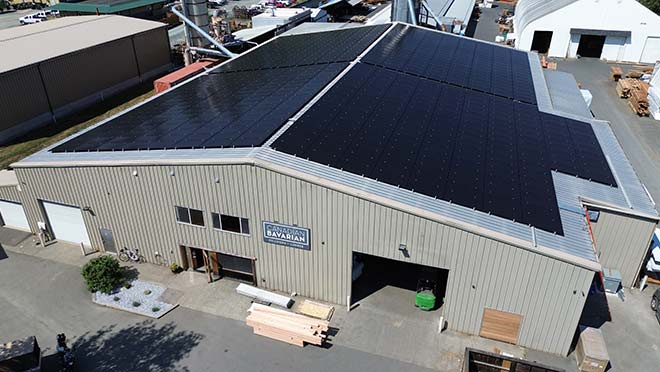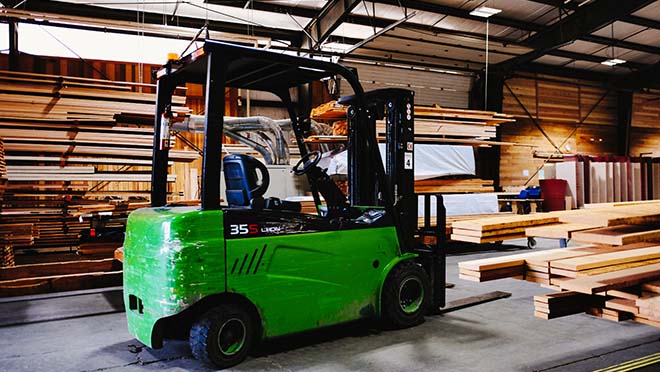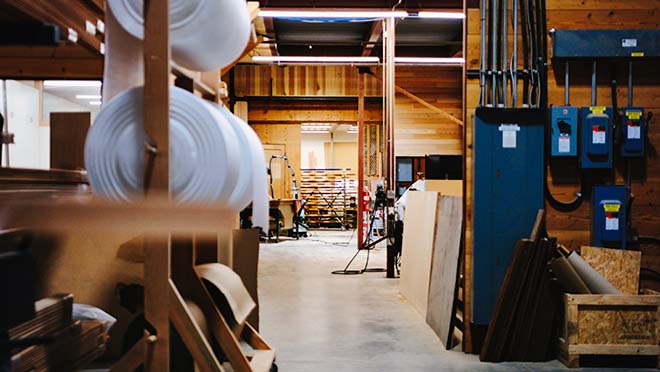 Canadian Bavarian Millwork + Lumber in Chemainus, B.C., – about halfway between Victoria and Nanaimo – installed a 318-kilowatt (kW) solar array on their workshop roof last summer. It’s expected to meet at least half of the company’s annual electricity needs.
Canadian Bavarian Millwork + Lumber in Chemainus, B.C., – about halfway between Victoria and Nanaimo – installed a 318-kilowatt (kW) solar array on their workshop roof last summer. It’s expected to meet at least half of the company’s annual electricity needs.
Vancouver Island millwork and lumber manufacturer installs a solar roof
Canadian Bavarian Millwork + Lumber has made a habit of wasting as little as possible.
For years, the Chemainus, B.C. maker of high-end wood products – from doors and architectural products to manufactured lumber – has heated its drying kilns and main work shop via a biomass burner that uses the wood left over from the crafting of its various products. And even sawdust gets repurposed: compressed into briquettes that burn cleaner and more efficiently than firewood in wood stoves and fireplaces.
So why not take advantage of BC Hydro's clean electricity to power its forklifts? And why not look up to the sun for electricity, captured by solar panels on the company's workshop roof?
"Twenty years ago, we started moving to a greener way of powering our operation," says Canadian Bavarian owner and operator Georg Wörnle. "We added biomass boilers, completely moving away from natural gas. More recently, BC Hydro supported a large LED lighting retrofit which was followed by the electrification of our forklift fleet. And after that, the next step was solar. We want to be as renewable as possible."
For the 318-kW solar project, Canadian Bavarian partnered with Shift Energy Group, a B.C.-based design-build firm specializing in solar and energy storage projects. The system came online late last summer, and is expected to generate enough power to meet more than half the company's annual electricity needs.
Next up? The addition of a battery through BC Hydro's energy storage incentive is estimated to save another 10% to 15% while also reducing costly power demand peaks by almost 80%.
"We've already taken advantage of the extra energy from solar to flatten our demand [from the BC Hydro grid] and lower our demand charges," says Wörnle. "And with battery storage, we can also pull from battery banks to power our machinery. The batteries can then recharge after hours through solar or by pulling in energy from the grid in non-peak hours."
For the solar panels, Canadian Bavarian cut costs through a BC Hydro incentive for load displacement. They also leaned on a federal clean technology tax credit to cover 30% of their capital costs, and a federal accelerated capital cost allowance – on certain equipment used to produce renewable energy – to add more savings through tax credits.
Electric forklifts turned out to be a great fit for Canadian Bavarian. Wörnle says that while bigger companies run forklifts eight hours a day, his company's forklifts run more sporadically, requiring charging every two or three days.
Meanwhile in the company's workshop, workers are warmed by the hot water – heated by the biomass plant – that runs through radiant piping. Shining down on their workspace are energy-efficient LEDs that replaced metal halide lighting via an upgrade project supported by BC Hydro incentives.
 Electric forklifts used at Canadian Bavarian only need to be charged every two or three days, making them a great fit for an operation that uses them only sporadically throughout the day.
Electric forklifts used at Canadian Bavarian only need to be charged every two or three days, making them a great fit for an operation that uses them only sporadically throughout the day.
Family-run business wants more local skilled workers as it expands
Canadian Bavarian remains a small family-run business. The elder Georg Wörnle emigrated from Germany to B.C. in the early 1980s and, with his wife Eva, started up a small shop in Chemainus that initially focused on turn-and-tilt European style windows and kitchen cabinets.
That's an ultra-competitive business, so the operation expanded – with the purchase of a moulder machine in the 1990s – into wood remanufacturing. They also added drying kilns and an increased focus on lumber remanufacturing, architectural millwork pieces and interior doors to serve the upscale market in Canada and abroad. Cabinetry remains part of the business, but is a small part.
At one point, Georg senior enlisted his son Georg, a chartered accountant, to prep the business for sale. But Georg junior wound up taking over on the family succession plan, and purchased the company from Georg senior and Eva.
Today, most of the company's products are used in high-end homes from Whistler and B.C.'s west coast to Hawaii and California, and for audacious architecture projects including an art gallery in Philadelphia (Calder Gardens) and a student centre at Amherst College in Massachusetts.
Georg junior's brother Marcus uses Canadian Bavarian's sawdust for his BioFlame business, which produces densified wood briquettes, made without chemical binders, to burn in any wood stove or solid fuel-burning furnace for homes and businesses on Vancouver Island.
The "Bavarian" in the company's name doesn't only reflect the company's roots. Facing a shortage of skilled wood labourers in B.C., the company uses work travel visas to bring in skilled workers from Europe, mainly from Germany, to fill some roles at the mill. In response to the challenge of finding and training qualified workers in B.C., the B.C. Government, through the Sector Labour Market Partnerships program, is providing $1.3 million to BC Wood to engage with businesses to attract and retain workers to the value-added wood products sector.
"That's great because we've always had a very difficult time finding that skillset, whether it's a moulder operator or a machinist," says Wörnle. "Generally, either we've been lucky or we've found somebody to train from within. Our local workforce started as general labour – you basically just show up after graduating [from high school] and we train you internally. Our production manager and our kiln manager started pulling off the green chain."
 Canadian Bavarian relied on BC Hydro incentives to complete a large LED lighting conversion in the shop, and the rooftop solar has produced as much as 27,132 kilowatt-hours (kWh) in electricity over a month
Canadian Bavarian relied on BC Hydro incentives to complete a large LED lighting conversion in the shop, and the rooftop solar has produced as much as 27,132 kilowatt-hours (kWh) in electricity over a month
Payback on solar expected to keep getting better
Solar photovoltaic (solar PV) costs have fallen by up to 90% over the last decade and are also around 40% more efficient than they were in 2010. Wörnle is confident that what's initially a longer payback period, due to the relatively low cost of buying energy from BC Hydro, will decrease.
"That longer payback is based on very small incremental price increases in BC Hydro rates, and we think that Hydro prices are going to increase over the next five years," he says, suggesting that the payback period will further decrease. "We thought we should get solar up and running now to displace load while we're working during the day."
After missing out on peak spring and summer solar production in 2024 – the system didn't come fully online until late August – the solar array had supplied 27% of Canadian Bavarian's electricity needs through December. Monthly generation totals ranged from a high of 27,132 kWh in May 2025 to a low of 4,777 kWh in December 2024.